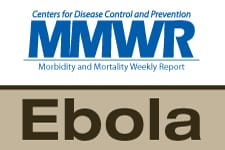Responding to a case of Ebola in Goma

During his June-July deployment to the DRC, CDC Epidemic Intelligence Service officer Nathan Furukawa worked closely with Congolese border health officials like Guillaume Bahati (left), the deputy station chief at Goma’s airport, and Dr. Clémentine Nchuti Mugisha, the airport station chief.
Photo credit: Nathan Furukawa, CDC
In fighting an outbreak of Ebola, there are days of slow, steady progress – and then there are days of drama.
Nathan Furukawa, a CDC Epidemic Intelligence Service officer, saw both when he was deployed to the Democratic Republic of the Congo from June through August this year.
“It’s very much a complex humanitarian emergency,” Furukawa said. “Being on the ground helped me understand how the underlying social and political dynamics complicate the response and make it a difficult place for an Ebola outbreak to occur.”
Like many CDC deployers, Furukawa was based in Goma, a city of 2 million perched on the border with Rwanda and home to an international airport. Much of the response has focused on keeping the disease from gaining a foothold in that urban center. DRC’s Ministry of Health has set up checkpoints on the roads heading into the city, at border crossings into Rwanda, and in the airport to screen for Ebola in travelers.
Furukawa worked closely with the country’s National Border Health Program at the airport to prevent importation of Ebola into Goma and exportation to other countries. While these efforts have been largely successful, they have not been able to completely keep Ebola out of Goma, and he was in Goma when the first case of Ebola arrived in the city in mid-July.
The patient was a pastor who came from one of the districts where the disease is active, and he died soon after arriving in the city for a religious conference. That led to an all-hands rush to strengthen the checkpoints around Goma and track down the people who the pastor had contact with during his journey.
“The following day, we had a series of very tense meetings going over gaps and shortcomings,” Furukawa said. Working with the Ministry of Health and other international partners, he triaged the most crucial changes needed to strengthen the checkpoints protecting Goma. Furukawa prioritized and facilitated the formation of a committee of airport partners and the development of a strategic plan to tighten up screening.
“The strategic plan was the culmination of months of work and several deployers before me trying to improve screening at the airport in a systematic fashion,” Furukawa said. “Once we were able to make this plan, so many improvements started falling into place.” The airport is now more prepared than ever to detect Ebola should a sick traveler show up, he says.
Furukawa was born in Los Angeles and grew up in Billings, Montana. He joined the CDC in 2018 after earning an MD and an MPH at the University of Washington.
He became interested in the Epidemic Intelligence Service in medical school after taking a class on emerging infectious diseases taught by a former EIS officer, Ann Marie Kimball. He normally researches pre-exposure prophylaxis for HIV for CDC’s National Center for HIV/AIDS, Viral Hepatitis, STD, and TB Prevention. But he says he’s glad to have pitched in to fight Ebola, and he encourages his colleagues to volunteer.
“In some ways it’s a leap of faith,” he said. “You’re going to a country you may never have worked in before, to work in a setting that’s totally unfamiliar. But the first step is believing you have what it takes – having the right attitude and being willing to learn is what is most important. So be bold and take that first step.”

